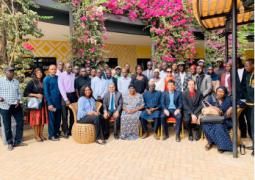
In The Gambia, Women Fish vendors in the coastal community of Gunjur have added their voice to the challenges brought about by the pandemic.
Women working in fish sector acknowledged that aside from scarcity of fish, the pandemic has also increased fish prices across the country.
It could be recalled that when the COVID-19 was first reported in The Gambia on 17th March 2020, government of The Gambia suspended all public gatherings, closed schools and houses of worship.
The state also scaled down the operational hours of markets and reduced the normal capacity of commercial vehicles to half.
These COVID-19 restrictions melted down the country’s economy and affected the business sectors, and fish vendors are not an exception.
Gambians depend largely on fish for their daily meals. The sector also provides income for many especially women.
“Most of the fishermen in Gunjur are from neighbouring Senegal and we normally buy our fish from them. However, due to the covid-19, many boats are not coming to The Gambia for fishing and that is a problem for us.” Sally Bojang, a vendor told The Point in an exclusive interview at Gunjur Market.
She explained that ‘if fewer boats go fishing’ there is always scarcity of fish in the markets.
The vendor further said normal price of fish per basket has increased, which she said, affected fishery businesses of all women in the market.
“Before the pandemic, we had many fishing vessels in the sea that would make a huge supply of fish in the market. But with the outbreak of the virus including government restrictions, few boats now engage in fishing.” she said.
In an article Published on The Point in 2020, the price of a basket of fish had risen from three hundred dalasi (D300) to one thousand and three hundred dalasi (D1, 300).
However, now the fish vendors in Gunjur say the price of fish per basket has continued to rise to D1, 300, D1, 400 to D1, 900 when the pandemic entered its second phase.
This, she added, had never been the case before the pandemic.
“All of us are affected by the pandemic. Imagine a basket of fish is now sold for D1, 400 to D1, 500 and in fact, Lady Fish is now costing D4, 500 to D 5000. It is very costly but we would have to buy it because we cannot stop dealing and selling as we depend on our sales to sustain our needs and that of our families,” she lamented.
Ms Bojang called on government to intervene in the pricing of fish at the various fish landing sites. This, she added, would help bring back their business.
Kaddy Barrow, another fish vendor, expressed similar sentiments. She said the price of fish is increasing rapidly due to covid-19 pandemic and this has forced several fishermen to reduce their activities at sea.
“We are faced with challenges in dealing with our customers, because when we buy fish at an expensive price, we have no choice than to sell it at high prices due to the increase in basket prices,” she said.
The scarcity and high price of fish, he added, is really affecting them as they depend on the money earned from their businesses to feed their families and pay for their children’s school fees.
Mariama Jallow is another fish vendor in the coastal community of Gunjur. For her part, the slack in businesses is really affecting her income, saying the market is her only hope to help her family.
“Fish is scarce and costly. I cannot sell everyday now because fish is scarce and the little available is very expensive. This is not good for my business as I entirely depend on my business for sustenance,” she desperately said.
In a recent interview with The Point, Basiru L. Bah, a legal practitioner, said Section 51 of the Women Act 2010 has given women the right to sustainable development including livelihood.
He, however, revealed that while Section 48 of the same Women Act states that women are entitled to food security, he said, the same section has mandated women to get facilities from the government that would help them to make money to live a decent life.
Tabu Sarr Njie, is a women rights activist and for her, there is need for government to support women working in the fisheries sector financially in order to help in restoring their financial losses due to the pandemic.
This story was produced with support from Journalist for Human Rights (JHR) through its Mobilizing media in the fight against Covid 19 in partnership with Mai-Media and The Point Newspaper.
Read Other Articles In National News





